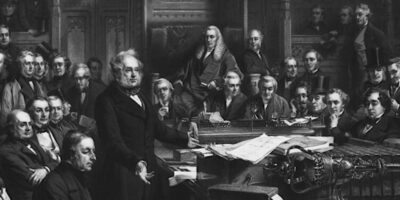International Trade: Freedom Beats Arbitrary Rule
It’s been both politically and intellectually depressing to see the reemergence of the protectionist impulse from within the White House, manifested first in the new tariffs on steel and aluminum but threatened on much more. Yes, we were warned. Yes, these were promised in the presidential campaign. Still, many of us hoped that something would happen that would cause good sense to prevail.
Surely, we believed, Donald Trump would come to see that tariffs harm far more people than they help. Surely he would see that a trade war would risk all the gains that have come from tax cuts and deregulation. Surely well-schooled advisers would prevail and the progress toward open societies and free-flow of goods and services would not be so arbitrarily stopped with such old-fashioned methods. The markets alone will speak if the threat ever became real.
Forging Ahead
But the truth has turned out to be otherwise. No research, evidence, market response, protest by economists and allies, has made any difference. Not even the resignation of the White House star intellect on economics, Gary Cohn, could shake the drive for tariffs. Perhaps the sweeping opposition from around the country did cause Trump to pull back from the full package and exempt Canada and Mexico. This is good. And this perhaps explains why the markets haven’t been as panicked as they might have been. What’s more, it is perhaps true that having now fulfilled a campaign pledge, he will move on to other topics, ticking this one off the list and getting back to cutting government back down to size.
However, we are already starting to see that the trade actions of one nation are never limited to that action alone; they inspire retaliation that takes unpredictable forms. Manufacturers of distinctively American products are very concerned. Jack Daniel’s Tennessee Whiskey is concerned about European retaliation. Makers of blue jeans and motorcycles are also worried. They could become the unintended victims of a tariff they opposed.
Power of an Idea
Presumably, the last thing Trump intended from this action was to harm peacefully functioning export markets, though any economist could have predicted this. In some ways, this action is a tribute to the power of an idea. Once an idea gets into the human mind, no amount of evidence or persuasion can make a difference. And there’s no question that the idea of protectionism is absolutely central to Trump’s economic and political worldview. Even though he has practiced freedom of trade in all his business dealings around the world, seeking out the best and cheapest sources of material and products from around the world, he is somehow under the belief that different rules should apply to “nations” as he sees them.
And it is a perfect storm. It was ideology mixed with unchecked power. Trade authority is centralized in the executive, such that Congress now has essentially no power over this realm of crucial policy. Intellectuals have no power. Nor editorial writers, think tank heads, or business lobbies. Unchecked seems often like it might be a good thing (the centralization of trade authority came about in the belief that this would be a better guarantor of free trade) but it is terrible when it doesn’t work.
As the days have passed, I’ve had friends tell me I’m overreacting. This is all just a ploy, they say, an effort to extract some concessions from some nations, and not that big of a deal. I hope this is right.
The Economist
But now I read the lead editorial from The Economist. This “is a potential disaster—both for America and for the world economy…. Not since its inception at the end of the second world war has the global trading system faced such danger…. If America pursues a mercantilist trade policy in defiance of the global trading system, other countries are bound to follow. That might not lead to an immediate collapse of the WTO, but it would gradually erode one of the foundations of the globalised economy.”
The editorial continues. “Even as Mr Trump behaves with astonishing irresponsibility, others must keep their heads. Some may impose limited retaliation—that, after all, is how to treat bullies, and the threat to local manufactures will strengthen the hand of Republicans pressing Mr Trump to relent. But such action must be proportionate and limited. A tit-for-tat war with America would be disastrous….
And more: “The world is a long way from the 1930s, thank goodness. Yet ignorance and complacency have put the trading system in grave danger. Free-traders need to recognise that the WTO can help keep markets open in the face of protectionist lobbying, at home and abroad. It is vital they make the intellectual case for rules-based trade. That will not be easy. For the first time in decades, their biggest foe is the man in the Oval Office.”
That frames it up nicely. This isn’t just about two classes of tariffs. It’s about whether we are going to have freedom of trade under rules, or the arbitrary discretion of one person who seems to reject the idea that trade itself is a win-win for everyone. It is about the core validity of the main insight of the classical economists that led to the end of mercantilism and the advent of a new form of mutually assured peace and prosperity.
The Republicans
Fortunately, members of Trump’s own party are pushing back very hard. The Republican letter opposing Trump, a very brave act given his popularity among the best, was quite erudite:
“We are writing to express deep concern about the prospect of broad, global tariffs on aluminum and steel imports. Because tariffs are taxes that make U.S. businesses less competitive and U.S. consumers poorer, any tariffs that are imposed should be designed to address specific distortions caused by unfair trade practices in a targeted way while minimizing negative consequences on American businesses and consumers.
“We were privileged to partner closely with you and your administration to develop and pass the Tax Cuts and Jobs Act. Your leadership on these tax cuts, in combination with your regulatory reforms, have done so much to increase the competitiveness of U.S. companies and restore the United States’ position as the best place in the world to do business. We are convinced that the benefits of these tax cuts are only beginning, and we look forward to building on this great success as the benefits continue to spread to U.S. workers and job creators. But adding new taxes in the form of broad tariffs would undermine this remarkable progress.”
Being politicians, they suggest some paths to reduce the damage. This is smart language, designed to appeal to the ideological leanings of the White House.
“First, any relief should be narrow, excluding all fairly traded products and all products that do not pose a national security threat. Second, a robust exclusion process should be announced at the outset that allows U.S. companies to petition for and promptly obtain duty-free access for imports that are unavailable from U.S. sources or otherwise present extenuating circumstances. Third, existing contracts to purchase aluminum or steel should be grandfathered to allow duty-free imports and avoid disrupting the operation and finances of projects that are already budgeted and underway. Fourth, the effects of this remedy on our economy should be reviewed and reconsidered on a short-term basis to determine if a different approach would better serve the interests of our American workers, job creators, and consumers.”
If the White Houses takes this seriously, and continues to add exemptions to the tariff measures, the material damage could be limited. The political damage to the global economic order is a different matter. Here George Will is right: “Big, bossy government does not get bigger or bossier than when it embraces protectionism — government dictating what goods Americans can choose, and in what quantities, and at what prices.”
It’s been a beautiful thing to observe the wonderful effects of the tax cuts and deregulation of the last year. The tariffs take us off this clear path to the goal. The only question remains: is this a cul-de-sac or a u-turn? My own hope is that the political posturing is over in this one sector and we can move forward again with progress toward a world of peace, prosperity, and free trade, and that arbitrary rule will not permanently derail the rule of law in international economic relations.












